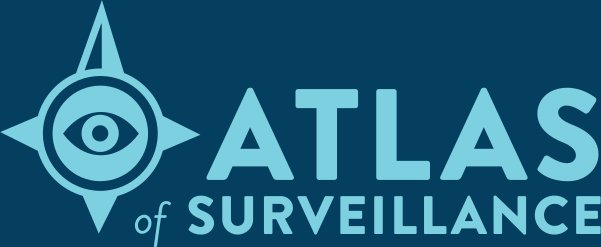About
Law enforcement surveillance isn’t always secret. These technologies can be discovered in news articles and government meeting agendas, in company press releases and social media posts. It just hasn’t been aggregated before.
That’s the starting point for the Atlas of Surveillance, a collaborative effort between the Electronic Frontier Foundation and the University of Nevada, Reno Reynolds School of Journalism. Through a combination of crowdsourcing and data journalism, we are creating the largest-ever repository of information on which law enforcement agencies are using what surveillance technologies. The aim is to generate a resource for journalists, academics, and, most importantly, members of the public to check what’s been purchased locally and how technologies are spreading across the country.
We specifically focused on the most pervasive technologies, including drones, body-worn cameras, face recognition, cell-site simulators, automated license plate readers, predictive policing, camera registries, and gunshot detection. Although we have amassed more than 12,300 datapoints in 5,500-plus jurisdictions, our research only reveals the tip of the iceberg and underlines the need for journalists and members of the public to continue demanding transparency from criminal justice agencies.
The Atlas of Surveillance data was last updated on March 7, 2025.
Credits
The Atlas of Surveillance project was made possible through a partnership with the University of Nevada, Reno Reynolds School of Journalism. It would not have been possible without the support and enthusiasm of Prof. Gi Yun, Associate Dean Donica Messing, and Dean Alan Stavitsky.
More than 1,300 students, teachers, volunteers, journalists, and other researchers contributed time, passion, and data to this project.
EFF Director of Investigations Dave Maass led the project and inquiries should be directed to him at aos@eff.org.
University of Nevada, Reno Research Interns
Madison Vialpando, Christian Romero, Matthew King, Dominique Hall, Javier Hernandez, Hailey Rodis, Taylor Johnson, Olivia Ali, JJ Mazzucotelli, Jayme Sileo, Melanie Mendez, Jacob Kostuchowski
Student Research Volunteers
Tiffany Jing, Zoe Wheatcroft
Bureau of Justice Assistance Body-worn Camera Grant Program Research
Prof. Ran Duan’s Data Journalism Class at Reynolds School of Journalism:
Matthew Aronson-Burrows, Kate Behring, Tashina Habibian, Kacee Johnson, Austin Paschke, Thomas Sarbacker
Real-Time Crime Center Research
Prof. Gi Yun’s Cybersecurity, Privacy and Society class (Reynolds School of Journalism):
Hunter Drost, Kirk Geller, D. Llaneza, Hailey Rodis, Stone Seuss, Cooper Venzon, Madison Vialpando, Javier Hernandez, Matthew Hinrichs
Southwestern Border Surveillance Research
Prof. Gi Yun’s Cybersecurity, Privacy and Society class (Reynolds School of Journalism):
Nick Acevedo, Taylor Harker, Matthew King, Yuka Kondo, Laila Lara Soto, Emily Macdiarmid, Jonathan Martinez, Austin Morriss, Anthony Mulholland, James Scripps
Additional Student Research Groups
Profs. Donica Messing, Caesar Andrews, and Todd Felts’ Media Writing classes at University of Nevada, Reno Reynolds School of Journalism
Prof. Gi Yun and Sheila Peuchaud’s Social Media classes at University of Nevada, Reno Reynolds School of Journalism
Prof. Patrick File’s Freedom of Information Act classes
Prof. Nitin Kohli and Deidre Mulligan's Behind the Data: Humans and Values class at UC Berkeley, School of Information
Prof. Andy Green's Client System Security and Network Security classes at Kennesaw State University
Electronic Frontier Alliance
Future Ada
Oakland Privacy
PDX Privacy
Lucy Parsons Labs
CRASH Space
Research Event Host
Tactical Tech and The Glass Room San Francisco
Dataset Contributors
Craig Nelson and Shelby Perkins
American Civil Liberties Union
MuckRock
Kevin Collier
Dan Gettinger and the Center for the Study of the Drone at Bard College
Shreyas Gandlur
Center for Human Rights and Privacy
Lisa Rein and the Aaron Swartz Day Surveillance Project
Center on Privacy and Technology at Georgetown Law
Data Tools
GovSpend
CometDocs
Maps powered by Esri
Special Thanks
Steven Rich, Washington Post
Australian Strategic Policy Institute
Jim Nintzel, Tucson Weekly
Seth Combs, San Diego CityBeat
Jorge Luis Serra, Border Center for Journalists and Bloggers
Trevor Paglen
Upturn
And all the EFF members who joined us for our Spring 2020 research sessions


